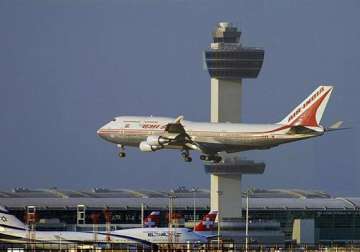New Delhi: Indian aviation authorities should strive to add more capacity than currently required to keep pace with the massive growth in the sector projected over the next decade, Heavy Industries Minister Praful Patel said on Sunday.
“Civil aviation in India has come a long way since 2004-05. But we have just made a beginning.
India's aviation sector will certainly become ten times larger in the next 10- 15 years. What we are witnessing today is the setting of the foundations for that to happen,” Patel said at a seminar organised by the Air Traffic Controllers' Guild (India) here.
Asking aviation authorities to build more infrastructure capacity than presently required keeping in mind the future growth prospects, Patel, a Civil Aviation Minister for seven years earlier, said the growth in the sector would need a large number of air traffic control officers (ATCOs).
“You should try to build more capacity to produce more than 200 ATCOs you need per year for our own operations. With the abundance of bright minds and trained manpower in India, you can create of pool of ATCOs who can not only serve in- house but also work across the world,” he said.
Maintaining that the DGCA was soon going to initiate the process of licensing the ATCOs, Patel said, “The day ATCOs get licensed, they can make use of the opportunities not only within India but in other parts of the world too.”
Noting that Indian airspace was the fourth largest after the US, Russia and China, he said managing such a busy air corridor over the Indian airspace and the high seas safely and smoothly was a major achievement.
Referring to his previous long tenure in the Civil Aviation Ministry, Patel said, “We have moved significantly forward since 2004-05. Look at the employment generation and improvements in air connectivity and the public travelling with ease now. If we had not done what we did then, all this would not have happened.”
He said even now there were only about 400 aircraft for 1.2 billion population compared with 10,000 planes for a population of about 40 crore in the US.
“Even if ten percent of Indians start flying, we would need over 1,000 more aircraft over and above the 400 we have now. That would also require more and more ATCOs and more sophisticated technology,” the Minister said.
Terming the ATCOs as the “unsung heroes of aviation”, DGCA chief Arun Mishra said, “There has been a silent revolution in air navigation services in India due to the major improvements carried out in terms of technology, manpower and training.”
Airports Authority of India's Board Member for Air Navigation Services V Somasundaram said significant developments have already taken place in the fields of air traffic management and navigation services.
“Compared to the situation in 2004-05 when 25-35 flight movements took place in an hour at Delhi and Mumbai airports, now we have 75 movements using three runways in Delhi and 45 using one runway at Mumbai,” he said.
Commenting on the nature of air traffic control job, ATC Guild General Secretary Manoj Sinha said “the phrase—to err is human—does not apply to ATC. We have zero tolerance for errors.” Guild President D K Behera and AAI Member (Planning) Sudhir Raheja were also present.
Latest Business News
